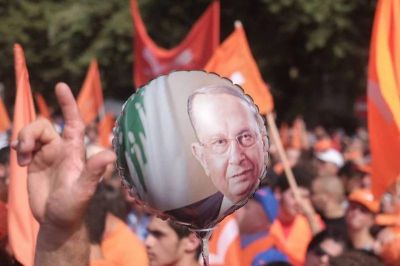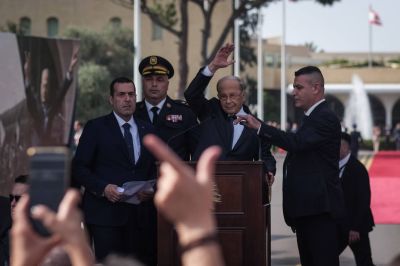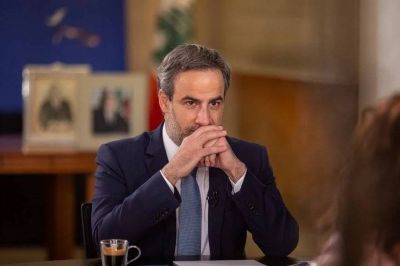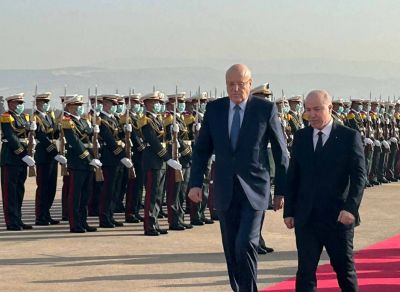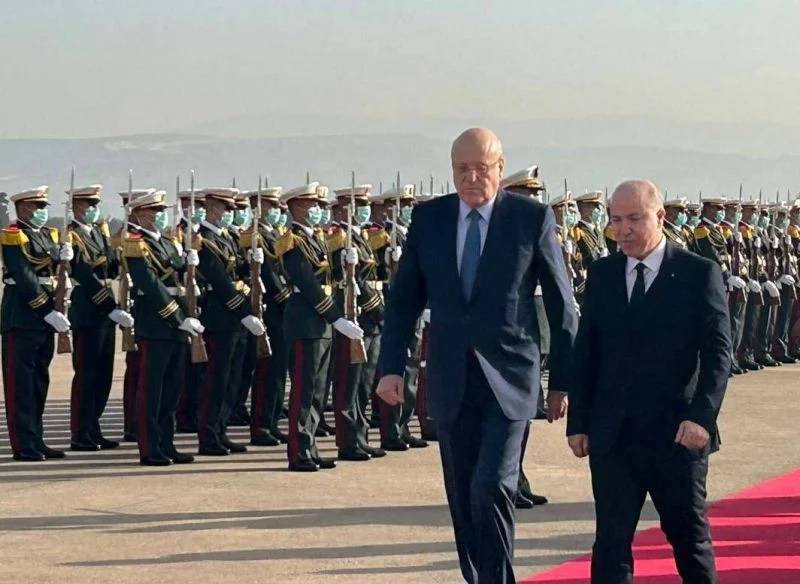
Caretaker Prime Minister Najib Mikati upon his arrival in Algiers on Oct. 31, 2022. (Credit: Dalati and Nohra)
“Where are we heading now?”
This question has been on everyone’s lips since Michel Aoun left the Presidential Palace on Sunday, leaving in his wake an unprecedented vacuum in the executive branch.
All the pressure that the Michel Aoun-Gebran Bassil tandem placed on caretaker Prime Minister Najib Mikati to have him form a last-minute cabinet — before Aoun’s term in office officially ended on Monday night — did not bear fruit.
The caretaker cabinet will therefore continue de facto to run the country’s affairs in a caretaker capacity, pending the election of a new president — an election that, given the lack of any consensus among parliamentarians, seems very distant indeed.
Mikati is more than ever keen to appear as the one who has no time to lose. A few hours before the end of the president’s term, he flew to Algiers to represent Lebanon at the Arab League summit.
He is accompanied by caretaker Foreign Affairs Minister Abdallah Bou Habib and caretaker Energy Minister Walid Fayad, both of whom are very close to Aoun’s son-in-law and Free Patriotic Movement leader Gebran Bassil, who had raised the specter that FPM-linked ministers could boycott the caretaker cabinet.
Yet, the Aoun-Bassil duo is not likely to accept defeat easily. A few hours before the end of Aoun’s six-year term, they played their last card against Mikati. Director-General of the Presidency Antoine Choucair met with Mikati on Monday. A source within the Free Patriotic Movement told L’Orient-Le Jour that Choucair proposed to his interlocutor to sign the cabinet formation decree, the composition of which would be the same as the caretaker cabinet, which assumed caretaker status following its automatic resignation in the wake of May’s parliamentary elections.
“We opted for this approach to avoid a complete paralysis in the country,” Eddy Maalouf, former MP for Metn, told L’Orient-Le Jour. “But since he does not want to form a new cabinet, Najib Mikati rejected our proposal, imposing the condition of obtaining our [vote of] confidence,” the former parliamentarian added.
This same confidence-related obstacle had led Hezbollah, a long-time ally of the FPM and a major supporter of Mikati, to halt its mediation to facilitate the formation of the cabinet.
“It’s over. The caretaker cabinet will handle day-to-day business despite everything,” said a source close to the prime minister, a cutting remark directed toward the FPM leader, whose ministers could boycott any cabinet meeting during the presidential vacuum.
Yet, Mikati, who masters the art of smoothing the edges in tough situations, aims to avoid the use of this card “so as not to provoke anyone,” he told a Gulf TV channel yesterday. He was referring to the FPM camp, the largest Christian representative in the caretaker cabinet and which says it is battling to prevent the cabinet, chaired by a Sunni prime minister, from taking over the prerogatives of the Maronite head of state.
Berri’s session and dialogue
Against this deadlock, Parliament is expected to meet tomorrow at 11 a.m. at Nejmeh Square in Downtown Beirut to read out the message Aoun sent just before his departure from Baabda. In the message, the former president asks Parliament to strip Mikati of his status as prime minister-designate. This is a purely formal step, insofar as the page related to the formation of a new cabinet was turned definitively with the end of Aoun’s six-year term.
The session will be held at a time when the Parliament is considered to have power limited to that of an electoral college — meaning its legislative prerogatives are legally on hold until it elects a new president. This has been the case since Oct. 21 (10 days before the end of the presidential term). However, Nabih Berri told L’Orient-Le Jour on Sunday that “the Parliament can do anything. This is my own jurisprudence.” The head of the legislature thereby indicated he is aware that his approach violates Article 75 of the Constitution. This article states that the Parliament, which has become an electoral college, can no longer legislate or take any other steps.
On Monday, Kataeb leader Samy Gemayel posted on Twitter this Constitutional article, insinuating that he was heading towards a boycott of the meeting on Thursday.
“No official decision has been taken so far,” a senior source within the Kataeb said. On Monday, the Kataeb MPs met in Saifi with a group of independent MPs and others representing the protest movement. Following the meeting, they urged Parliament to meet to elect a president as “an absolute priority,” the text reads. These parliamentarians intend to express this position on Thursday in Parliament.
The same goes for the Lebanese Forces. “We will take part in the session to emphasize the uselessness of Michel Aoun’s message and to insist that the presidential election needs to be held as soon as possible,” MP Ziad Hawat, (LF/Jbeil), told L’Orient-Le Jour.
This article was originally published in French in L'Orient-Le Jour. Translation by Joelle El Khoury.
